(srpski) Poziv na obeležavanje Međunarodnog dana ljudskih prava 10. decembar 2014.

Sorry, this entry is only available in srpski.


Sorry, this entry is only available in srpski.
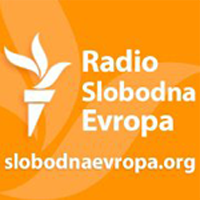
Sorry, this entry is only available in srpski.

Sorry, this entry is only available in srpski.

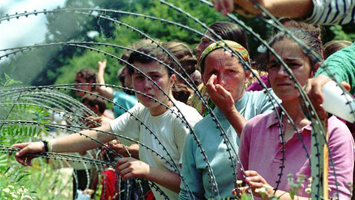 A talk show host on the Prva srpska televizija (First Serbian TV Station), Ivan Ivanović, mocked victims of rapes committed during and in relation to the war in Bosnia and Herzegovina (BiH) in his show broadcast on November 30th, 2014, thus seriously offending thousands of rape victims in BiH. Human rights organizations demand that Prva srpska televizija and Ivan Ivanović make a public apology to victims of rapes committed during the war in BiH, and that they show the movie Grbavica, which discusses the fate of women who were raped in BiH, at the usual time dedicated to this talk show, in order to indicate respect for these victims.
A talk show host on the Prva srpska televizija (First Serbian TV Station), Ivan Ivanović, mocked victims of rapes committed during and in relation to the war in Bosnia and Herzegovina (BiH) in his show broadcast on November 30th, 2014, thus seriously offending thousands of rape victims in BiH. Human rights organizations demand that Prva srpska televizija and Ivan Ivanović make a public apology to victims of rapes committed during the war in BiH, and that they show the movie Grbavica, which discusses the fate of women who were raped in BiH, at the usual time dedicated to this talk show, in order to indicate respect for these victims.
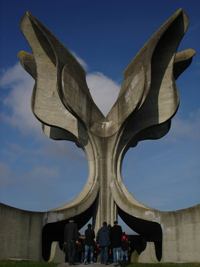
 A two-day visit to memorial sites in Bosnia and Herzegovina and Croatia was organized as part of the study programme of the Regional School of Transitional Justice. Twenty-five students of the third generation of the Regional School of Transitional Justice visited the memorial monument and memorial museum in Jasenovac, Croatia, first, after which they visited Prijedor, Vukovar and Sotin, sites where mass crimes happened during the wars of the 1990s.
A two-day visit to memorial sites in Bosnia and Herzegovina and Croatia was organized as part of the study programme of the Regional School of Transitional Justice. Twenty-five students of the third generation of the Regional School of Transitional Justice visited the memorial monument and memorial museum in Jasenovac, Croatia, first, after which they visited Prijedor, Vukovar and Sotin, sites where mass crimes happened during the wars of the 1990s.
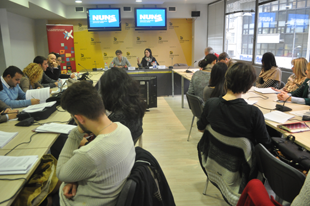
The Humanitarian Law Center (HLC) presented on 21st November 2014 the Analysis of media discourses on war crimes trials in Serbia 2003-2013 and the Analysis of political discourses on domestic war crimes trials in Serbia 2003-2013. The main findings of the analyses were presented by the author, Dr Katarina Ristić, a researcher at the University of Leipzig. Before that, HLC Executive Director Sandra Orlović in her introductory remarks stressed that the Serbian media reporting seldom represented the cathartic element that opens the broader social dialogue about the past, and that the institutions themselves also did not perceive the trials as something that can generate dealing with the past. Thus war crimes trials, the only functional mechanism of transitional justice in Serbia, are unable to fully contribute to dealing with the past in Serbia.
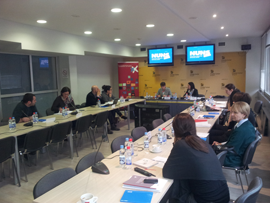
 The fifth consultation session with regard to the production of a Draft Strategy for the Prosecution of War Crimes in Serbia was held on Friday November 21st, 2014, in the Media Centre in Belgrade. This meeting was dedicated to the presentation of war crimes trials in public.
The fifth consultation session with regard to the production of a Draft Strategy for the Prosecution of War Crimes in Serbia was held on Friday November 21st, 2014, in the Media Centre in Belgrade. This meeting was dedicated to the presentation of war crimes trials in public.